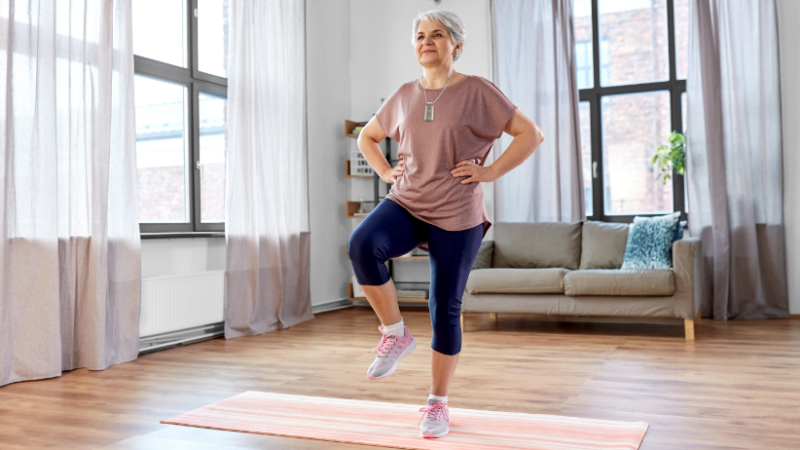Any amount of exercise is better than no exercise, even if it involves sneaking in a few squats while watching TV or going for a quick, five-minute walk after dinner. Just a few minutes of exercise can boost your energy and mood and reduce symptoms of many health conditions.
Fortunately, you can fit and “sneak” exercise into your daily lifestyle. You don’t need to sign up for exercise classes or purchase costly exercise equipment.
The CDC recommends that adults aged 65 and older do moderate-intensity activities (such as brisk walking) at least 150 minutes a week, muscle-strengthening activities at least two days a week, and activities that improve balance at least three days a week.
Try these practical exercises for aging adults that can improve your health and make you feel great both physically and mentally.
Lift Household Goods
Soup cans, bags of flour, milk jugs, bottled water, and books are examples of household items you can use as weights to build muscle. Lifting these items can improve muscle tone and strengthen joints and reduce symptoms like joint pain and soreness. Next time you’re watching TV, grab some of these items and use them as weights or dumbbells during commercial breaks.
Play Dance Music
Cooking, gardening, and household chores can often be made more fun with music—especially dance music that makes you feel more energetic and puts a bounce in your step. Instead of doing chores to the backdrop of television, turn on music and move your body in time with the rhythm.
March in Place
Marching in place requires you to lift your knees high, which can increase strength and power in all the muscles in your lower body—including your calves, hamstrings, and hip flexors. This exercise can also improve your balance and coordination, and it can be done anywhere, at any time.
Stand up straight with your feet positioned hip-width apart. When you begin to march, start slowly and make sure to raise your knees to the height of your hips. While doing this exercise, focus on good posture and avoid rotating your body. Swing your arms in the opposite direction of the raised leg.
If you like the idea of being able to exercise at your favorite public venues, consider our medical alerts for seniors that can help you stay safe and connected wherever you go—such as the MGMove, which includes step-counting apps so you can set goals and track your progress.
Do Wall Sits
Wall sits can be performed nearly anywhere as long as you have access to a wall, such as in your bedroom or living room, or in a place like a movie theater where you are standing in line near a wall. This exercise can increase strength and mobility in your arms, shoulders, back, and legs and improve your posture.
Stand with your back against a wall and slowly lower your back until your body is positioned in a way that makes it feel like you are sitting in an invisible chair. Your knees should be at a 90-degree angle. Maintain this position for as long as possible and extend the time by a few seconds every time you do this exercise.
Turn Your Head
Keeping your neck and head in one position for too long while reading, watching TV, or using the computer can lead to stiffness and soreness in your neck and shoulders.
When sitting still for long periods, slowly turn your head to one side and stop when you feel a slight stretch in your neck. Hold this position for several seconds, then turn your head back to the front. Repeat this exercise for the other side, and do a total of 12 to 15 reps. This exercise can improve flexibility in your neck.
Do the Flamingo
The flamingo exercise involves standing and balancing on one foot, which can be done while you’re cooking, standing in line, or watching TV. It can improve your balance and strengthen the muscles in your core.
Hold on to stable furniture (for extra support, if needed), and raise one of your legs until your thigh is parallel to the ground. Balance on the other foot and focus on feeling the muscles in your core supporting your balance. Hold this position for as long as you can—trying to aim for at least one minute. Repeat this exercise on the other leg.
Use Your Hands When Cooking
Blenders, food processors, and electric food choppers may all be convenient to use in the kitchen, but they make you slightly less active. Next time you prepare a meal, take time to do things by hand to burn a few extra calories. Use a handheld masher to mash potatoes, cut vegetables by hand, and use a handheld whisk instead of an electric whisk. These small changes can strengthen your arms and hands and may also help you reduce stress.
Practice With Jar Lids
Opening tight jars can be frustrating and difficult, especially if you suffer from joint pain and arthritis. Try approaching this task as a workout instead, which can help strengthen your arm muscles and gradually reduce your pain over time as you get better at it. Open and tighten the lids on jars repeatedly to improve flexibility, mobility, and strength in your arms and hands.
At Medical Guardian, we understand how important it is for aging adults to access medical help when needed. Our top-rated medical alerts for everyday use can help you stay safe, whether exercising in your home or waiting in line at your favorite stores. Contact us today at (800) 668-9200 to learn more about our many on-the-go and at-home medical alert systems.

